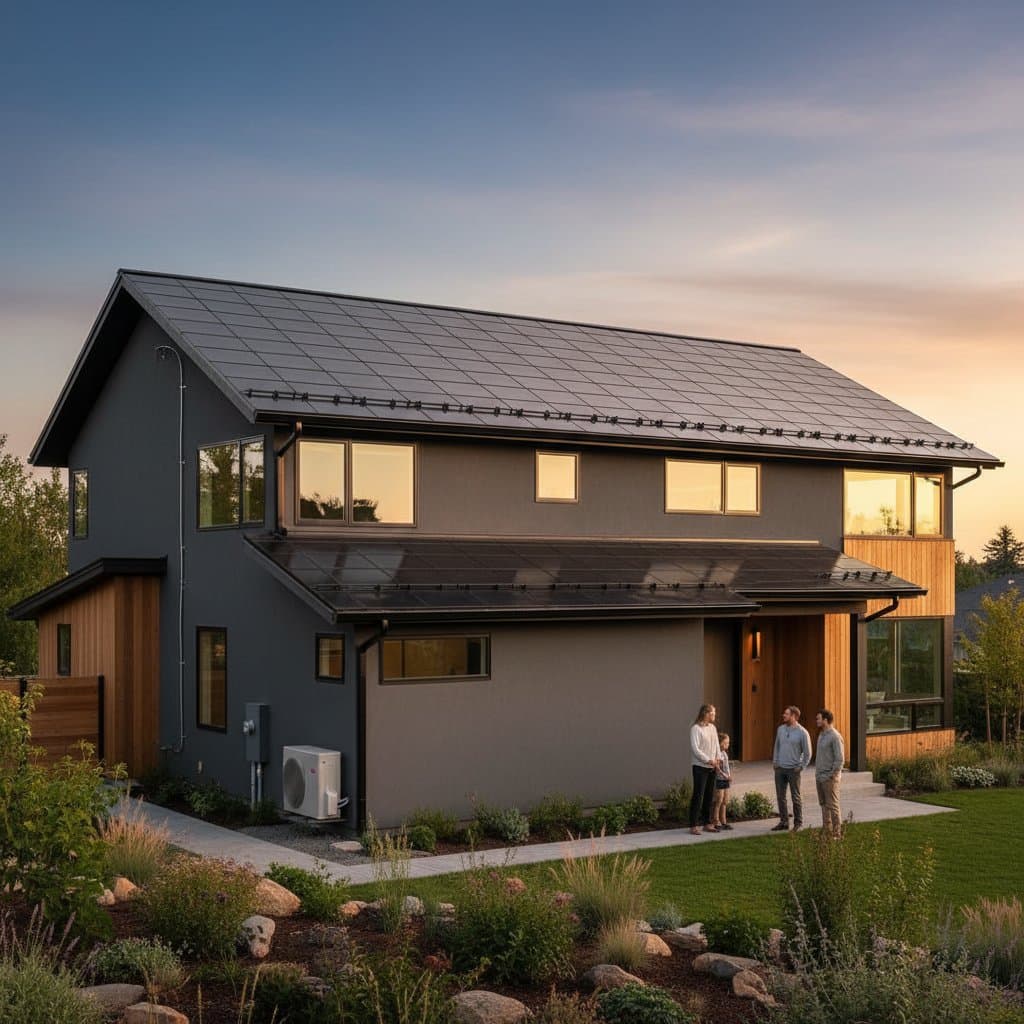Solar Shingles vs Panels: Tesla, GAF, CertainTeed
The U.S. residential solar market experiences a structural shift as integrated solar roofing gains popularity among homeowners who value performance alongside aesthetics. Traditional photovoltaic panels still lead most installations, yet solar shingles, or building-integrated photovoltaics (BIPV), emerge as a strong alternative. Tesla, GAF Energy, and CertainTeed spearhead this field, each employing unique strategies in design, production, and distribution.
Data from the Solar Energy Industries Association shows residential solar capacity expanding across the nation. Homeowners increasingly evaluate roof-integrated solutions during roof replacements. Roofing and electrical contractors now explore hybrid models that merge their expertise.
Key Differences Between Shingles and Panels
Standard solar panels mount above existing roofs via aluminum racking and flashing. These units, typically 65 inches by 39 inches, connect in arrays along rails. Solar shingles replace conventional roofing materials, functioning as both protective layers and power generators.
Photovoltaic cells laminate within tempered glass or polymer in each shingle. They interlock mechanically and electrically for direct roof deck integration, bypassing separate hardware and minimizing roof height.
Conventional panels achieve efficiencies above 20 percent, surpassing the 14 to 18 percent of solar shingles. Homeowners weigh aesthetics against output and cost per watt. Those favoring seamless integration opt for shingles; others prioritize maximum energy yield with panels.
Tesla Solar Roof: Technology Focus
Tesla, based in Austin, Texas, transformed solar roofing perceptions with its Solar Roof launch. Tempered glass tiles embed monocrystalline solar cells, paired with non-solar tiles for a cohesive look. Each tile withstands impacts akin to premium roofing standards.
Production combines in-house facilities and partners. The system pairs with proprietary inverters, Powerwall batteries, and monitoring tools, forming a complete renewable setup.
Certified installers handle both roofing and electrical tasks, though Tesla's rigorous training extends timelines. Analysts note higher per-watt costs due to labor and equipment, despite superior aesthetics.
Andrew Baglino, Tesla's Senior Vice President of Powertrain and Energy Engineering, emphasized scalability in an investor briefing. "We build a roofing product that generates energy without sacrificing durability or design."
Tesla refines assembly and logistics to cut installation time and expenses.
GAF Energy Timberline Solar: Roofing Network Leverage
GAF Energy, a San Jose, California subsidiary of Standard Industries, taps North America's largest roofing manufacturer network. Timberline Solar distributes through established contractors, differing from Tesla's integrated approach.
Large-format shingles nail to the roof deck, easing installation over panels or glass systems. Encapsulated cells protect under durable polymer, allowing standard tools and minimal solar-specific training.
Martin DeBono, GAF Energy President, highlighted trade connections in a presentation. "We merge roofing and solar into one category. Contractors' homeowner relationships provide scale."
U.S. manufacturing ensures supply chain reliability and federal incentive eligibility. Timberline Solar meets roofing and electrical codes, serving as a full roof replacement.
Wood Mackenzie research suggests GAF accelerates adoption via roofing specialists. Pricing balances cost and aesthetics between panels and Tesla's offerings.
CertainTeed Apollo: Traditional Evolution
CertainTeed, in Malvern, Pennsylvania and part of Saint-Gobain, brings legacy expertise to solar with Apollo shingles and tiles. Apollo II suits asphalt and flat roofs, accommodating diverse home styles.
Resembling architectural shingles, Apollo installs via standard methods. Self-contained modules feature aluminum frames and tempered glass, wiring to conventional inverters for broad installer compatibility.
Reliability drives CertainTeed's strategy, with warranties aligning roofing and solar coverage. Mark Graham, Director of Solar Product Management, stated, "We integrate solar into roofing discussions. It functions as a building material, not merely electrical."
Efficiency trails premium panels slightly, yet modular design enables selective roof integration. This suits partial replacements or symmetry needs.
Cost and Installation Insights
Costs guide decisions for homeowners and contractors. Rooftop solar panels average 2.50 to 3.50 dollars per watt, varying by size and location. Solar shingles range from 4.00 to 7.00 dollars per watt in full replacements.
Elevated prices reflect material demands, skilled labor, and roofing ties. For planned roof jobs, incremental solar addition proves competitive. Retrofitting existing roofs rarely justifies shingles financially.
Panel arrays install in two to three days for a 7 kW system. Shingles demand a week or longer, involving removal, underlayment, and wiring. Tesla requires tile mapping and precise routing.
Performance and Warranty Details
Efficiency and degradation matter greatly. Tier-one panels offer 25-year warranties retaining 80 to 85 percent capacity. Shingles provide comparable terms, though heat affects output.
Flush mounting limits airflow versus raised panels, raising temperatures. Manufacturers counter with enhanced encapsulation, wiring, and thermal materials.
Tesla warrants power output and weatherization against cracks and leaks. GAF and CertainTeed combine roofing and solar protections, streamlining claims.
This integration shifts focus from isolated energy systems to holistic building solutions.
Market Trends and Hurdles
Solar shingles claim a minor U.S. residential share due to installer shortages, costs, and workflow complexities. Scaling production and training promise cost reductions.
Roofs offer vast solar potential, replaced every few decades. Tying solar to maintenance cycles boosts accessibility.
Federal tax credits cover shingles equally with panels; state incentives enhance viability. Domestic production aids GAF and CertainTeed competitively.
Tesla's brand draws interest amid rising rivalry from roofing experts versed in codes and networks. Growth hinges on streamlined workflows and crew training.
Integrating Solar into Everyday Roofs
Roofing and solar convergence redefines residential renewables. Homeowners demand energy solutions that enhance, rather than disrupt, design.
Tesla drives tech innovation; GAF utilizes networks and manufacturing; CertainTeed stresses reliability.
Professionals select based on needs: shingles for aesthetic roof renewals, panels for yield optimization.
Maturing practices position integrated roofing as mainstream, uniting power, protection, and style in unified systems.
